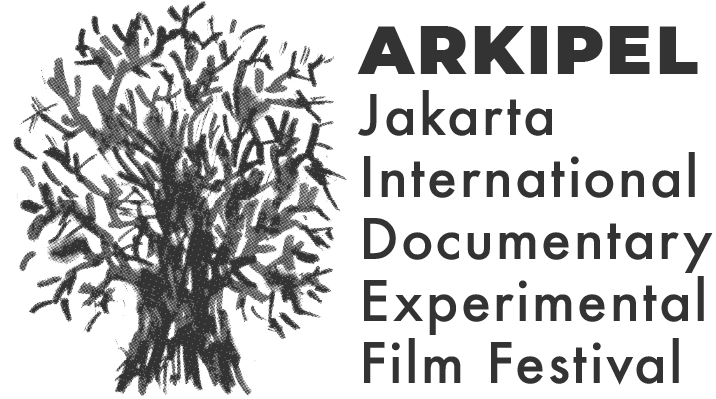Peran Politis Teknologi dalam Kompetisi Internasional 1
Kehadiran teknologi di era sekarang telah mendeterminasi praktik kehidupan kita sehari-hari. Setidaknya hal tersebut terlihat dari bagaimana cara kita menatap layar gawai sampai respon kita terhadap berbagai fitur teknologis yang terus-menerus bermutasi hingga menjadi persoalan yang begitu dekat dan menubuh. Persoalan-persoalan teknologis ini kemudian menjadi bingkaian dalam usaha membaca aspek-aspek bromocorah dalam konteks sekarang.
Melalui filem yang berjudul Big Brother Hui (Feng Yangyang, 2019) dan Chinafrica.mobile (Daniel Kötter, 2017) dalam program Kompetisi Internasional 1: Alegori Politis Bromocorah Dari Determinisme Teknologi, yang ditayangkan pada hari Rabu, 21 Agustus 2019, di GoetheHaus, Goethe-Institut Jakarta, Manshur Zikri – sebagai selektor program ini – mengelaborasi gagasan mengenai determinisme teknologis yang secara proporsional terbingkai sebagai persoalan bahasa.
Sulit bagi saya sendiri — dan mungkin, 17 orang lain dalam Auditorium GoetheHaus, pada pemutaran kali itu — mengandaikan suatu bingkaian yang dapat mencakup dua filem dengan narasi yang nyaris tak bersinggungan. Big Brother Hui adalah rekaman keseharian Hui, lelaki asal Heinnan yang bermigrasi ke Guangdong dan menjadi “The Big Brother” dalam bisnis judi dan prostitusi. Chinafrica.mobile sendiri adalah esai kritis terhadap siklus produksi teknologi telepon genggam yang alur persebarannya melewati tiga negara; Republik Demokrasi Kongo, China, dan Nigeria.
Saya melihat ada dua persoalan yang berbeda dalam kedua filem tersebut. Kebromocorahan yang selalu berada di luar sistem ter-representasikan melalui identitas subjek dalam filem Big Brother Hui serta laku atau model kerja dalam filem Chinafrica.mobile. Jika peran teknologis dapat terlihat langsung pada Chinafrica.mobile yang memang secara gamblang menelusuri siklus produksi telepon genggam, saya membaca aspek teknologis dalam filem Big Brother Hui bukan dari segi naratif, melainkan intervensi kamera dalam menangkap momen keseharian Hui. Kita bisa kembali merujuk pernyataan Zikri bahwa determinisme teknologis ini menjadi modus bahasa yang digunakan sutradara. Saya justru mengalami kesulitan ketika memahami bagaimana determinasi teknologi dibingkai sebagai alegori politis bromocorah. Sayangnya, saya tak sempat bertanya lebih lanjut mengenai hal tersebut selepas pemutaran, sebab sesi tanya-jawab tak sempat berjalan lama, meski sebelumnya Zikri sempat mengulas secara singkat tulisan kuratorialnya untuk program ini. Tepat 2 jam setelah pemutaran pertama dimulai pada pukul 13:00, kami meninggalkan auditorium GoetheHaus.
Saya baru sempat berdiskusi lebih lanjut dengan Zikri selepas program pemutaran. Bahwa, menurutnya bromocorah dilihat bukan hanya pada praktik, namun juga sebagai perangkat untuk membaca sistem secara lebih luas. Konsep bromocorah ini bisa dilihat dalam bagaimana siasat Yangyang menggunakan teknologi — dalam hal ini, kamera dan gawai — yang telah menubuh dengan kehidupan sehari-hari masyarakat untuk masuk ke dalam realitas personal tokoh dalam filem Big Brother Hui. Kamera tidak lagi mengalami keberjarakan yang riskan jatuh pada glorifikasi capaian kriminal si tokoh. Sehingga, teknologi di sini bukan hanya berperan sebagai alat perekam, namun juga subjek yang mempunyai peran politis untuk membaca sistem yang lebih luas. Peran politis ini juga bisa dibaca dari cara Kötter yang, bukan hanya mengobservasi alur produksi telepon genggam, tetapi juga sebagai refleksi terhadap posisi sosio-kultural penggunaan teknologi di luar dunia pertama.
The Political Role of Technology in International Competition 1
The presence of technology in the current era has determined the practices in our everyday life. At least, it is shown in our behavior of staring at device screens and our responses towards various technological features that constantly mutates until it becomes something intimate and embodied. These technological matters then grow into a frame within the efforts to understand the aspects of bromocorah in the current context.
Through the film Big Brother Hui (Feng Yangyang, 2019) and Chinafrica.mobile (Daniel Kötter, 2017) in International Competition 01: Bromocorah’s Political Allegory by Technological Determinism, screened on Wednesday, August 21, 2019, at GoetheHaus, Goethe-Institut Jakarta, Manshur Zikri – as the selector of the program – elaborated the notion of technological determinism framed proportionally as a language matter.
It is quite difficult for me – and perhaps, other 17 audiences in GoetheHaus Auditorium in this screening – to imagine a frame able to encompass the two films with an almost non-intersecting narrative. Big Brother Hui is a record of the everyday life of Hui, a native Heinnan man who migrated to Guangdong and became ‘The Big Brother’ in gambling and prostitution business. Chinafrica.mobile itself is a critical essay towards the production cycle of mobile phones whose distribution flow traverses through three countries; the Democratic Republic of Congo, the People’s Republic of China, and Nigeria.
I saw two different issues in the two films. Bromocorah, who is always outside of the system, is represented through the identity of the subject in Big Brother Hui and the work mode in Chinafrica.mobile. While the technological role can be seen straight in Chinafrica.mobile that explicitly traces the mobile phone production cycle, I see the technological aspect in Big Brother Hui is not in the narrative aspect, but in the camera intervention in capturing Hui’s everyday moments. We could refer back to Zikri’s statement that this technological determinism becomes a language mode used by the director. I faced difficulty in understanding how technological determinism is framed as bromocorah’s political allegory. Unfortunately, I did not have the chance to question further on that point after the screening due to the short duration of the QnA session, although Zikri had previously explained his curatorial text of the program briefly. Precisely two hours after the screening started at 1:00 pm, we left GoetheHaus Auditorium.
I had the time to discuss the matter with Zikri after the screening. According to Zikri, bromocorah is seen not only on its practice but also as a device to comprehend the system more broadly. The concept of bromocorah could be seen on Yangyang’s strategy in using technology — in this context, camera, and gadget — embodied in everyday life of society to dive into the personal reality of the character in Big Brother Hui. The camera is no longer distanced and risked to fall into the glorification of the character’s criminal achievements. Here, technology no longer plays a role as a mere recording device, but also a subject with a political role to comprehend the broader system. This political role could also be understood through Kötter’s way that not only observing the production flow of mobile phones but also as a reflection of socio-cultural use of technology outside the first world countries.




